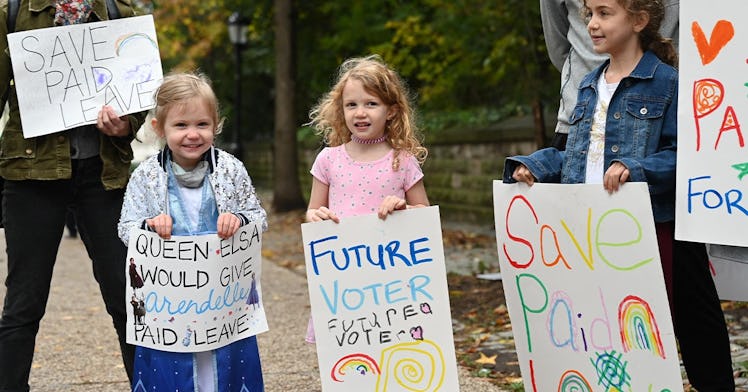There’s One Very Good Reason Federal Paid Leave Is Inevitable
Small businesses with state paid leave programs overwhelmingly support the program, and small business support matters.

Right now, the push to pass federal paid family and medical leave in the United States is basically everywhere. While the federal government is on the cusp of passing a four-week plan that would cover workers who don’t already have state plans or a plan through their place of work, its passage in Biden’s Build Back Better Plan — though totally necessary — is far from guaranteed. And because it’s such a hot-button topic, constant arguments against enacting the policy are nearly everywhere. But a new study shows that some of the opposition to the program — some conservatives and business groups say that federally guaranteed paid family leave has come from business groups that say that small businesses will be hurt or even forced to close, if they have to pay employees not to work.
But a new survey actually shows the opposite: that many small business owners, particularly those with direct experience with a state-run program, actually support paid family leave.
In a National Bureau of Economic Research working paper on small companies in New York and New Jersey, two states that do have paid family leave policies, 71 percent said they were very or somewhat supportive of paid family leave.
That’s up 11 points from the last time the survey was conducted, before the pandemic, with increases larger among firms that had an employee use their state’s paid family leave benefit. That suggests that experience with PFL led to employers becoming more supportive and that the experience of COVID-19 changed many minds from opposed to in favor of the policy.
Of course, the survey was limited to a relatively small sample, which the researchers acknowledge.
But it’s also true that the concerns of small businesses in New York and New Jersey are shared by those in other states and that it’s an assumption, not a fact, that the bulk of small businesses are against the expansion of paid family leave laws.
“Contrary to some commonly-cited rhetoric, small employers in states with PFL programs are actually quite supportive of PFL,” the report concludes, “suggesting that concerns about negative impacts on such firms should not be an impediment to enacting PFL programs.”
And given the effect that the COVID-19 pandemic is having on these firms—increasing support and decreasing opposition—”the post-COVID-19 period could be an opportune moment for considering further related legislation.” Standing in the way is a combination of corporate donations to politicians, a bipartisan desire to appear “pro-business,” and the unfair way federal representation favors conservatives has meant progress on federal paid family leave has stalled. But there are also reasons to be hopeful.
Five states and Washington, DC, already have paid family leave mandates on the books. Nearly 200 major companies publicly supported national paid leave in a March letter to Congress, and a whopping 82 percent of Americans are also in favor of the policy.
Most recently, a week after the opposition of conservative Democrat Joe Manchin got paid family leave removed from the White House’s Build Back Better framework, House Democrats unexpectedly reinserted a federal paid family leave guarantee back into the Build Back Better Act passed by the House last week. That leaves Senate Democrats to figure out how to get Manchin’s support, a tall order but an opportunity that, until recently, it didn’t even look like they would have. But in the meantime, the idea that businesses don’t want to pass a program that helps them remain competitive when hiring, a program that increases work-life satisfaction, and a program that makes happier and more productive employees is just silly.